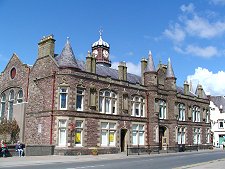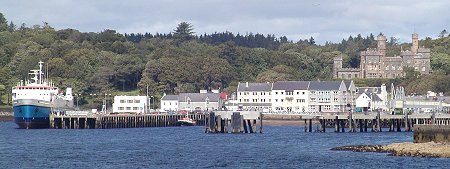

Algemene informatie
 The name of Stornoway comes from the Norse for "Steering Bay", an
indication of the very early origins of the town. As the best natural harbour
in the Western Isles it was an obvious focus for development, and Stornoway
Castle was built as early as 1100 by the MacNicol family. The castle was later
captured by a Viking called Leod, who founded the dynasty that later became
the MacLeods of Lewis.
The name of Stornoway comes from the Norse for "Steering Bay", an
indication of the very early origins of the town. As the best natural harbour
in the Western Isles it was an obvious focus for development, and Stornoway
Castle was built as early as 1100 by the MacNicol family. The castle was later
captured by a Viking called Leod, who founded the dynasty that later became
the MacLeods of Lewis.
Clan disputes flared through the 1500s and the MacLeods remained a thorn in
the side of the Edinburgh government. In 1597 James VI adopted a new approach
to resolving the problems posed by his Gaelic-speaking subjects. He leased
Lewis to a group of lowland businessmen called the "Fife Adventurers" and
authorised them to use all means necessary, including what would today be called
genocide, to "root out the barbarous inhabitants". The Fife Adventurers
were beaten off by the the MacLeods, and finally gave up after a third attempt
in 1608. In response, James VI withdrew the MacLeod's charter in 1610 and granted
Lewis to the MacKenzies of Kintail, who ran their estates from afar.
Stornoway Castle was destroyed by Cromwell's forces in 1653 and the last remains of it removed in the 1800s to provide foundations for a pier. Its site lies somewhere near the recently built ferry terminal. From 1661, Lewis became part of Ross-shire and was administered from distant Dingwall, an arrangement that was to last until the creation of the Western Isles Council in 1975.
Stornoway grew through the 1700s, with some fifty slated buildings in the town by 1789. The 1800s saw the town take advantage of the herring boom, with as many as 6000 fishermen operating from the port during its peak, supported by large numbers of gutters and packers.
In 1844 Lewis was sold by the MacKenzies to Sir James Matheson for £190,000. Matheson found an island containing just one wheeled vehicle, and set to work building roads, training islanders, establishing a daily mail service from Portree and Lochinver: and building Lews Castle on a site overlooking the harbour. Lews Castle is now part of Lews College. The Mathesons in turn sold Lewis to Lord Leverhulme in 1918, who spent some time and a lot of money trying to modernise it before giving up and turning his attentions instead to Harris.
 Transport links improved with the establishment in the 1850s of steamer services
to Glasgow via Portree and to Oban, and in 1894 there was a daily steamer from
the railhead at Strome Ferry, plus less frequent links to Stromness and Liverpool.
But while the sea lay behind Stornoway's growth it also led to its most tragic
moment, on 1 January 1919. The ship Iolaire was wrecked entering the harbour
and 205 Lewismen returning home after surviving the war were drowned within
sight of home.
Transport links improved with the establishment in the 1850s of steamer services
to Glasgow via Portree and to Oban, and in 1894 there was a daily steamer from
the railhead at Strome Ferry, plus less frequent links to Stromness and Liverpool.
But while the sea lay behind Stornoway's growth it also led to its most tragic
moment, on 1 January 1919. The ship Iolaire was wrecked entering the harbour
and 205 Lewismen returning home after surviving the war were drowned within
sight of home.
In 1934 air services started to Renfrew and Inverness, and during world War Two the RAF built what is now Stornoway Airport, just to the east of the town. Today it continues to provide links to Glasgow and Inverness, as well as with Benbecula and Barra. Transport by sea has also improved. Car ferries replaced steamers from 1973, the start of the service that now links Stornoway with Ullapool.
Today's Stornoway is by far the largest settlement in the Western Isles, a bustling and attractive town. The harbour remains busy with freight, ferry and leisure traffic, and home to a significant fishing fleet. The shape of the town is defined by the harbour, which partially surrounds it. A number of the streets in the centre are pedestrianised, providing good access to an interesting range of shops pleasantly different from the usual outlets colonising most UK High Streets.
Visitors to Stornoway should be aware that Sunday observance is strong here.
Most transport links to Lewis and Harris, and within them, do not operate on
a Sunday. Most shops, petrol stations, cafes, pubs, visitor attractions are
closed on Sundays, as are at least some public toilets. Sunday observance is
part of the culture of Lewis and Harris, and part of what makes them unique.
However, given the difficulty in accessing services of any kind on a Sunday,
our advice would be to ensure you know exactly how your food, drink, transport
and accommodation is going to be provided in advance.